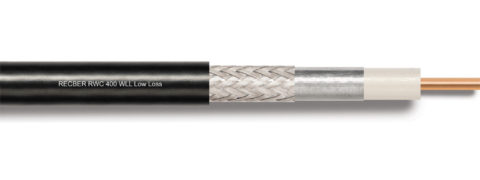
| Operating Temperature | -30°C …+70°C |
| Bending radius min. | min. 10 x D |
| Impedance
Capacitance Velocity of propagation |
50 ± 3 Ω
78.5 ± 2 pF/m (85 ± 2)% |
| Attenuation @20°C | max. 30 MHz 2.38 dB/
100 m 50 MHz 3.01 dB/ 100 m 150 MHz 5.10 dB/ 100 m 220 MHz 6.18 dB/ 100 m 450 MHz 8.96 dB/ 100 m 900 MHz 13.02 dB/ 100 m 1500 MHz 17.33 dB/ 100 m 1800 MHz 19.24 dB/ 100 m 2000 MHz 20.45 dB/ 100 m 2500 MHz 23.30 dB/ 100 m 5800 MHz 38.92 dB/100 m |
| Insulation resistance min.
Return loss Segregation class Screen Attenuation |
min. 2 GΩ x km
30-1000 MHz > 23 dB 1000-3000 MHz > 20 dB “d” EN 50174-2 30-3000 MHz ≥ 90 dB |
| Test voltage | 5000 V |
| Operating voltage max. | 2000 V |
| Standards | EN 50117, IEC 61196 |
| Fire performance | Vertical flame propagation EN 60332-1-2 (PVC-HFFR) Corrosive gas EN 60754-1/2 (HFFR) Smoke density EN 61034-2 (HFFR) |
| EU declaration of conformity | LVD Low Voltage Directive 2014/35/EU RoHS Restriction of Hazardous Substances 2011/65/EU |
RWC Low Loss cables are manufactured based on the new-generation 3-layer physical foam technology. Provides superior performance for 50-ohms broadband wireless applications.Lower loss, a higher velocity of propagation and better RF screening compared to conventional RG cables. Generally terminated with BNC, TNC, SMA and N-Type connectors. Used in radio and wireless communication, RFID, WiFi, Distributed antenna systems (DAS), Wireless Internet (WISP), Global positioning (GPS) systems, defence industry and telecommunication systems. Cables with polyethylene sheath are preferable in outdoor and underground installations while the halogen-free version is mainly intended for areas that require fire resistance.
Conductor Electrolytic copper wire, Ø 2.70 mm
Insulation Physical foam PE, Ø 7.20 mm 70°C, EN 50290-2-23
Screen Al-Pet-Al foil min. 100% coverage Tinned braided copper wire, 85% coverage
Sheath PVC – RAL 9011 Black, Ø 10.2 mm TM51 70°C, EN 50290-2-22 PE – RAL 9011 Black, Ø 10.2 mm 80°C, EN 50290-2-24 HFFR – RAL 9011 Black, Ø 10.2 mm 70°C, EN 50290-2-27
